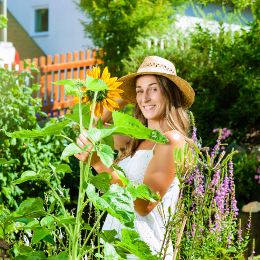In order to have an entire garden filled with vibrant sunflowers, you need to know how to take care of the plants. Read the Buzzle article for all the necessary details for proper care and maintenance tips.

Did you know?
There are approximately 60 different species of annual and perennial sunflower across the world. Plus, yellow is not the only color sunflowers are found across the world. You can find gold, orange, mahogany red, and bronze sunflowers as well. And the center part of the flower also has various colors like yellow, purple, red, and brown.Do you know what daisies look like? Well to me, these flowers look like jumbo daisies with gold in it. All 60 species of sunflowers bloom right around late summer or early fall. Many of the species are native to North America, but can be cultured all over the world.
I'm sure most of you must know this already, but when the plant is still immature, the head tends to turn and face the sun every morning. It follows the sun's movements throughout the day. As wonderful and surprising these flowers may be, they are very easy to grow and take care of.
Water Requirements
While watering the plants, make sure you don't do so too often. This is probably one of the most common mistakes amateurs make. Although the plants are sturdy, excess water can result in loosening of the soil, making it difficult for the roots to stay steady. Plus, the plants won't have enough support to keep the head stable from the wind.
Water the plants 20 days before and after the blossoms appear. If the soil is rich for growth, you need to water the plants only if there was no rain for a week or two. It's also recommended that you grow large groups of sunflowers to increase the stability of the soil. This helps the roots to reach deep into the soil, hold the moisture in, and protect the plants from any damage caused by the wind.
Fertilizer Requirements
Providing these plants with a rich diet is not a priority, given that the soil you've planted them in is rich to begin with. If the soil has lots of organic matter like earthworms and microbes, the soil is already getting the necessary nutrients it demands. But since these plants are capable of growing at least 6 feet in height, that too in only about 3 months, you can add some fertilizer to it; slow-acting granular fertilizer to be exact.
Try to control the admission of nitrogen as it delays the appearance of the blossoms. Plus, while growing super-sized seed heads, use slightly more fertilizer when you first notice them.
Mulch Requirements
Add a layer of mulch to enrich the soil and the plants. The use of organic mulch is highly recommended as it helps in decomposing and improving the soil. Once the plants sprout, place 2 inches of chopped leaves, wood chips, or straw on the soil. And if you're using peat moss, make sure to add some more organic materials as well (otherwise it results in repelling water).
Pest Control Requirements
The sunflower head attracts many insects and pests such as birds, squirrels, aphids, whiteflies, sunflower head moths, sunflower beetle, sunflower maggots, cutworm, caterpillars, headclipping weevil, and many more. These insects and pests can cause serious damage to the plants, flowers, seeds, leaves, and stems. You can use pesticides that are specifically made for these plants. However, it is advised not to spray the pesticides when bees, wasps, ants, butterflies, and other pollinating insects are present.
Weed Control Requirements
As these plants tend to grow really fast, there are chances that unwanted weeds can also grow on their own. This can create shades for sunflower seedlings and stop their natural growth cycle. You can't stop the weeds from growing, but you can surely control its population. You can either till or hoe the area in the middle of the rows where the plants are growing. Or, you can use some chemicals to kill the weeds. Make sure you use chemicals that don't affect the seeds. Depending on what type of weeds are growing, you can use appropriate chemicals to kill it.
Gardening is fun and fruitful when you know what you're doing. Hopefully the information given in the article helps you grow a lush garden with healthy sunflower plants and blossoms.






